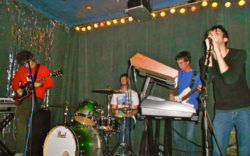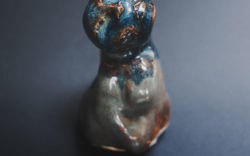“It’s been a really weird couple of years,” says Scott Woodward, nursing a beer underneath a peak mid-afternoon sun. The mustachioed bandleader, who performs as T.S. Woodward, has been on a rollercoaster ride of denial, re-routing and acceptance since his start at UGA in 2011. With little background in either performance or composition, Woodward was forced to find an alternative route to attain his degree after being turned away from the Hugh Hodgson School of Music. Though the experience proved to be incredibly taxing, Woodward’s outside-the-box thinking and a sturdy support system helped his dreams—both figurative and literal—come to fruition.
“I knew that I wanted to study music when I came here, but it was always a pretty big uphill climb,” says Woodward, who started off playing drums as a teenager before making his way to guitar and then piano. After completing two years of prerequisite requirements in and outside of the music department, Woodward auditioned for enrollment at Hugh Hodgson twice, to no avail—once with voice and once on piano.
“It was hard to hear [the rejection] then, but it makes a lot of sense now,” he says. “Music education, the way it’s set up, is just designed for people that have been doing it their entire life and have been in the system studying classical music. It wasn’t enough for me to just like classical music.”
But Woodward wasn’t ready to give up. He began to explore his options, consulting other UGA faculty members for advice before honing in on the Interdisciplinary Studies Program. “It’s like a shadow branch of Franklin,” Woodward says. “It was really hard to find out about it and get more information.”
The program, which essentially allows students to create their own majors from multiple fields of study, as long as the majors reside within the Franklin College of Arts and Sciences, gave Woodward the opportunity to study composition and perform while incorporating coursework in music business, production and creative writing, too.
With renewed purpose and his degree in popular music composition safely underway, Woodward began to put into practice what he had been learning, taking full advantage of the resources the music school had to offer. “I would just sign up on a calendar when I was going in [to one of the school’s recording studios], which ended up being every single weekend for the better part of a couple years,” he says.
Around this same time, Woodward had been having a series of recurring dreams involving drowning and learning how to breathe underwater—an uncanny mirror to the distress and subsequent adaptation he had been dealing with in real life. These dreams quickly became the songwriter’s creative focus. “I relate to the dream world a lot more than the real world,” he says with a sincere smirk.
Indeed, listening to the fruit of his labor, the surrealistic How to Breathe Underwater/In the Black Box double LP, one can feel that Woodward made these scenes from sleep his own musical refuges. The album is comprised of two distinct sections: The first is a studio-recorded batch of four experimental pop songs and five electronic pieces; the second is a series of four pop tunes sandwiching three instrumentals, recorded live as part of Woodward’s exit show.
Together, the 16 songs introduce listeners to both sides of Woodward’s educational focus and also give a glimpse into his second world, “a swirling, shifting no-man’s land populated by the specters of memory and ambition.”
Needless to say, Woodward’s more than happy for the rollercoaster ride to be over and to be accepted into the fold by the gatekeepers who originally prevented his entry. As the long process of learning and creating comes to a close—with a celebratory release show slated for Friday at Flicker—Woodward wants to “get quiet again,” but also has new ideas churning about for T.S. Woodward.
“I change faster than T.S. Woodward does—or can,” he says of his two identities. One thing that hasn’t changed, though, throughout this whole ordeal and into post-graduate life, is a determination to simply continue turning his dreams into reality. “All I want,” he says, “is to keep playing and learning.”
Like what you just read? Support Flagpole by making a donation today. Every dollar you give helps fund our ongoing mission to provide Athens with quality, independent journalism.










